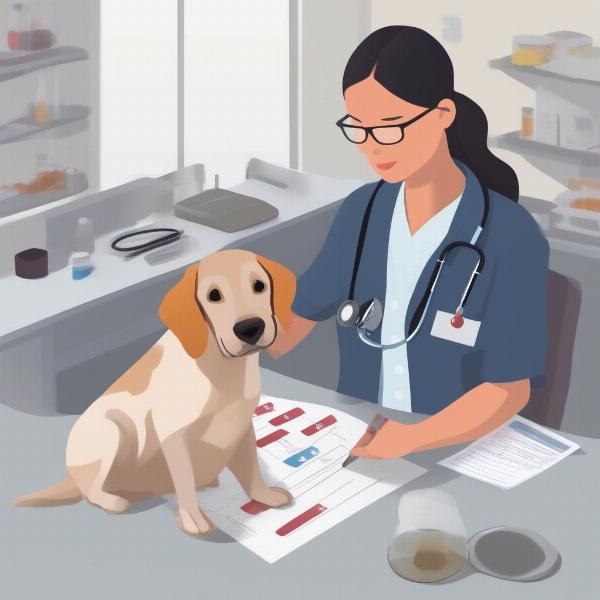Alkaline phosphatase (ALP) is an enzyme found throughout the body, with particularly high concentrations in the liver and bone. In dogs, ALP levels are routinely checked during blood tests and can offer valuable insights into their overall health. Understanding what fluctuations in ALP levels mean can be crucial for early diagnosis and treatment of various conditions. This article will delve into the significance of ALP in dogs, exploring the reasons behind elevated or decreased levels, and discussing what you should do if your dog has abnormal ALP results.
 High ALP Levels in Dog Blood Test
High ALP Levels in Dog Blood Test
What is Alkaline Phosphatase (ALP) in Dogs?
ALP isn’t one single enzyme, but rather a group of enzymes primarily found in the liver and bone. Puppies, due to their active bone growth, naturally have higher ALP levels than adult dogs. Certain medications, such as corticosteroids, and some diseases can also influence ALP activity. While ALP is a useful indicator, it’s not a diagnostic test on its own. It’s essential to consider it in conjunction with other blood parameters and clinical signs to accurately assess a dog’s health.
Causes of High ALP in Dogs
Elevated ALP in dogs, also known as hyperphosphatasemia, can stem from various factors. Some of the most common causes include:
- Cushing’s Disease (Hyperadrenocorticism): This hormonal disorder leads to excessive cortisol production, significantly increasing ALP.
- Liver Disease: Conditions like cirrhosis, hepatitis, and tumors can cause liver cells to release more ALP into the bloodstream.
- Bone Diseases: Certain bone cancers, infections, and metabolic bone diseases can elevate ALP.
- Certain Medications: Steroids, anti-seizure drugs like phenobarbital, and some antibiotics can induce higher ALP activity.
- Growth in Puppies: As mentioned earlier, puppies naturally have higher ALP due to rapid bone development.
Causes of Low ALP in Dogs
While less common, low ALP (hypophosphatasemia) can also occur in dogs. Potential causes include:
- Malnutrition: Inadequate nutrition can lead to decreased ALP production.
- Hypothyroidism: An underactive thyroid can sometimes result in lower ALP levels.
- Certain Genetic Conditions: Some rare genetic disorders can affect ALP production.
- Zinc Deficiency: Zinc is essential for ALP activity, and a deficiency can lead to lower levels.
What to Do If Your Dog Has Abnormal ALP Levels
If your dog’s blood test reveals abnormal ALP levels, don’t panic. It’s crucial to consult your veterinarian. They will conduct a thorough examination, considering other blood test results, your dog’s medical history, and clinical signs to determine the underlying cause. Further diagnostic testing, such as imaging or biopsies, may be necessary to reach a definitive diagnosis and develop an appropriate treatment plan.
Conclusion
Monitoring ALP levels is an important part of assessing a dog’s health. While abnormal ALP isn’t a diagnosis in itself, it’s a valuable clue that can guide further investigation. By working closely with your veterinarian and understanding the potential causes of ALP fluctuations, you can ensure your furry friend receives the appropriate care and treatment. Remember, early detection and intervention are key to managing many health conditions effectively.
FAQ
- What are normal ALP levels in dogs? Normal ALP values can vary between laboratories, but generally range from 20-150 U/L for adult dogs.
- Is high ALP always a serious problem? Not necessarily. High ALP can be caused by relatively benign factors like certain medications or normal growth in puppies.
- Can diet affect ALP levels in dogs? Yes, malnutrition can lead to decreased ALP levels. A balanced diet is crucial for maintaining optimal health.
- What other blood tests might be done alongside an ALP test? Other common tests include complete blood count (CBC), liver function tests, and kidney function tests.
- How often should my dog have blood work done to check ALP? The frequency of blood work depends on your dog’s age, health status, and any underlying conditions. Your veterinarian will recommend an appropriate schedule.
- Can stress affect ALP levels in dogs? While stress can affect various physiological processes, it’s not a common cause of significant ALP changes.
- What is the treatment for high ALP in dogs? The treatment depends entirely on the underlying cause. It could range from medication to dietary changes to surgery.
Related Articles
(Add links to relevant articles on ilmdog.com if available, otherwise omit this section)
About ILM Dog
ILM Dog (https://ilmdog.com) is your trusted global resource for expert dog care advice. We provide comprehensive information on dog breeds, health, training, nutrition, grooming, and much more, catering to both new and experienced dog owners. Whether you’re seeking guidance on choosing the right breed or need help understanding your dog’s health needs, ILM Dog is here to support you. For personalized advice or inquiries, reach out to our expert team at [email protected] or call us at +44 20-3965-8624.